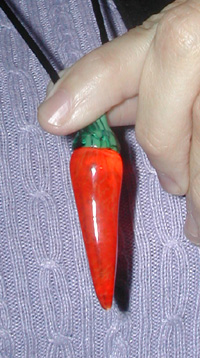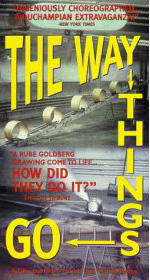It’s Monday, it’s cold and overcast, and I’m grading papers. As it turns out, these are perfect conditions to make me grumpy.
Rather than wallow in it, though, I’ve decided to be proactive about trying to head off future grumpiness. My philosophy of science classes are about to embark on some exercises about scientific theory choice, for which they will be considering Ptolemaic and Copernican accounts of planetary motions. Having done these kind of exercises for many semesters, I know that there’s a good chance I’ll end up with stacks of papers that may make me howl in despair if I don’t read the riot act now. We’re not just talking the essay opener, “Since the dawn of time man has pondered X,” nor the conclusion, “In the end, how can we ever know?” We’re talking hard-core Bugs Bunny history.
I like Bugs Bunny as well as the next academic, but I prefer that historical claims in essays that I must grade not be outrageously false. So, here’s my attempt to innoculate my students:
Carnivals, challenges, et cetera.
There are some recent carnivals of note that I should mention:
*Skeptics’ Circle 44 at Salto sobrius.
*Carnival of the Godless 50, also at Salto sobrius.
*Teaching Carnival #13 at A Blog Around the Clock.
As well, if you have a hankering for SAT-style essays, you’ll want to check out the results of the bloggers SAT Challenge.
Making real changes in the landscape of science.
I want to commend to you a pair of posts that strike me as calls to action. Both relate to the oft-discussed “pipeline problem” in the sciences. And, I take it that both authors are interested in making science (and especially academic science) a less hostile environment not just for women, but for others who love science but, frankly, may not have much patience for current institutional or societal barriers to entry to the tribe of science.
Friday Sprog Blogging: a forceful film.
The elder Free-Ride offspring has been learning about forces (“pushes and pulls”) in second grade science class. Meanwhile, at home both the sprogs found a new favorite film, The Way Things Go. It’s about 30 minutes of nearly continuous Rube Goldberg machinery. There are a few visible cuts in the film, which seem to be pauses to let chemical reactions proceed (although it would be completely understandable to me if cuts had been required to get some of the more complicated mechanical interactions to work). The progress of the apparatus is presented without narration, which is just as well, since it would be drowned out by the giggles and belly-laughs. Here are the sprogs’ viewing notes:
Why is this visual representation intelligible?

Elder offspring: Hey, that’s a cool chili pepper necklace.
Dr. Free-Ride: Do you know that I’ve had this necklace for about ten years and you are the first person who didn’t think it was a carrot?
Elder offspring: A carrot? That doesn’t look like a carrot!
Dr. Free-Ride: I didn’t think so, either. But I’m guessing it’s because the chili is orange, and people don’t recognize orange chilies as easily as red ones.
Elder offspring: Still, the shape’s all wrong for a carrot.
Dr. Free-Ride: I’m really pleased with your powers of observation and your ability to distinguish different fruits and vegetables based on subtle differences in shape.
Elder offspring: Thank you.
Younger offspring: (Coming into the room) Is that a chili pepper necklace?
Dr. Free-Ride: See, you didn’t think it was a carrot, either!
Younger offspring: Did you get that at Chili’s? No, the shape isn’t exactly like the chili in the logo.
Dr. Free-Ride: I’m still pleased about the powers of observation, but suddenly less pleased about the objects of observation.
I want a spinach salad.
I can’t remember a time I have had a more severe jones for a spinach salad than the last few days. The perfect balance of crisp and earthy and creamy, whose eating would be not merely a mechanical refueling of my body, but a transcendant experience — is that too much to ask?
Well, during a spinach-borne outbreak of E. coli O157:H7 it is. But, while I dream of spinach (and grade papers), I’m thinking of how information (or lack of information) about our foods plays a role in our ability to make choices about what to eat.
Why I’m raising the sprogs vegetarian.
In a comment on the last post, zwa asks:
I’m curious about your vegetarianism (as one myself) and whether your kids are. If yes, did they choose it, if no did you try to convince them?
My kids are vegetarians, and have been since birth — so they didn’t choose it. I have imposed it on them in a stunning act of maternalism.
OK, it’s actually not that stunning.
Anyway, for the curious, here are my reasons for this particular parenting choice:
Friday Sprog Blogging: kindergarten empiricism.
Younger offspring padded in and climbed into bed with us at 5:58 this morning. In a rare show of solidarity (or alertness), younger offspring was the one to hit the “snooze” button when the alarm went off at 6:00.
Dr. Free-Ride: Good morning.
Younger offspring: Why do you say it’s morning?
Dr. Free-Ride: (drowsily) Huh?
Younger offspring: How do you know it’s morning? It still looks pretty dark.
Dr. Free-Ride: I know from the time on the clock. But you’re right, it is pretty dark. Maybe it’s not morning yet. Maybe we should just stay under the covers for awhile.
Younger offspring: No, if you say it’s morning, I think it’s probably really morning.
Dr. Free-Ride: You decide now is the right time to accept authority?
A matter of life and death: scientific judgment without borders.
In Tripoli, Libya, five nurses and a physician are in danger of being executed by firing squad if the international scientific community doesn’t raise its voice.
As reported by Nature:
The six are charged with deliberately infecting more than 400 children with HIV at the al-Fateh Hospital in Benghazi in 1998, so far causing the deaths of at least 40 of them. …
During the first trial [in 2004], the Libyan government did ask Luc Montagnier, whose group at the Pasteur Institute in Paris discovered HIV, and Vittorio Colizzi, an AIDS researcher at Rome’s Tor Vergata University, to examine the scientific evidence. The researchers carried out a genetic analysis of viruses from the infected children, and concluded that many of them were infected long before the medics set foot in Libya in March 1998. Many of the children were also infected with hepatitis B and C, suggesting that the infections were spread by poor hospital hygiene. The infections were caused by subtypes of A/G HIV-1 — a recombinant strain common in central and west Africa, known to be highly infectious.
But the court threw out the report, arguing that an investigation by Libyan doctors had reached the opposite conclusion. Montagnier believes the judgement was based at least partly on mistranslation from English to Arabic of the term ‘recombinant’ — instead of referring to natural recombination of wild viruses, as intended, it was interpreted to mean genetically modified, implying human manipulation.
(Bold emphasis added.)
The evidence suggests that the children were infected due to negligence in the hospital — but not by the six health care providers on trial for their lives. Conveniently, they are foreigners — a Palestinian physician and five Bulgarian nurses, so the Libyan court and hospital can exact “justice” without accepting anything like responsibility for the errors that infected the children.
But to cast scientific evidence aside so you can put your convenient scapegoats before the firing squad is absolutely intolerable.
If ye be talkin’ like a pirate, ought ye be walkin’ like a pirate?
Avast, it be International Talk Like a Pirate Day, and we’ve seized this blog from that landlubber Stemwedel! We’ve run up a new flag (designed by that pirate’s pirate Pough), and Cap’n Free-Ride is drivin’ this ship now.
But, me hearties, ye know that there’s honor among pirates, don’t ye?




